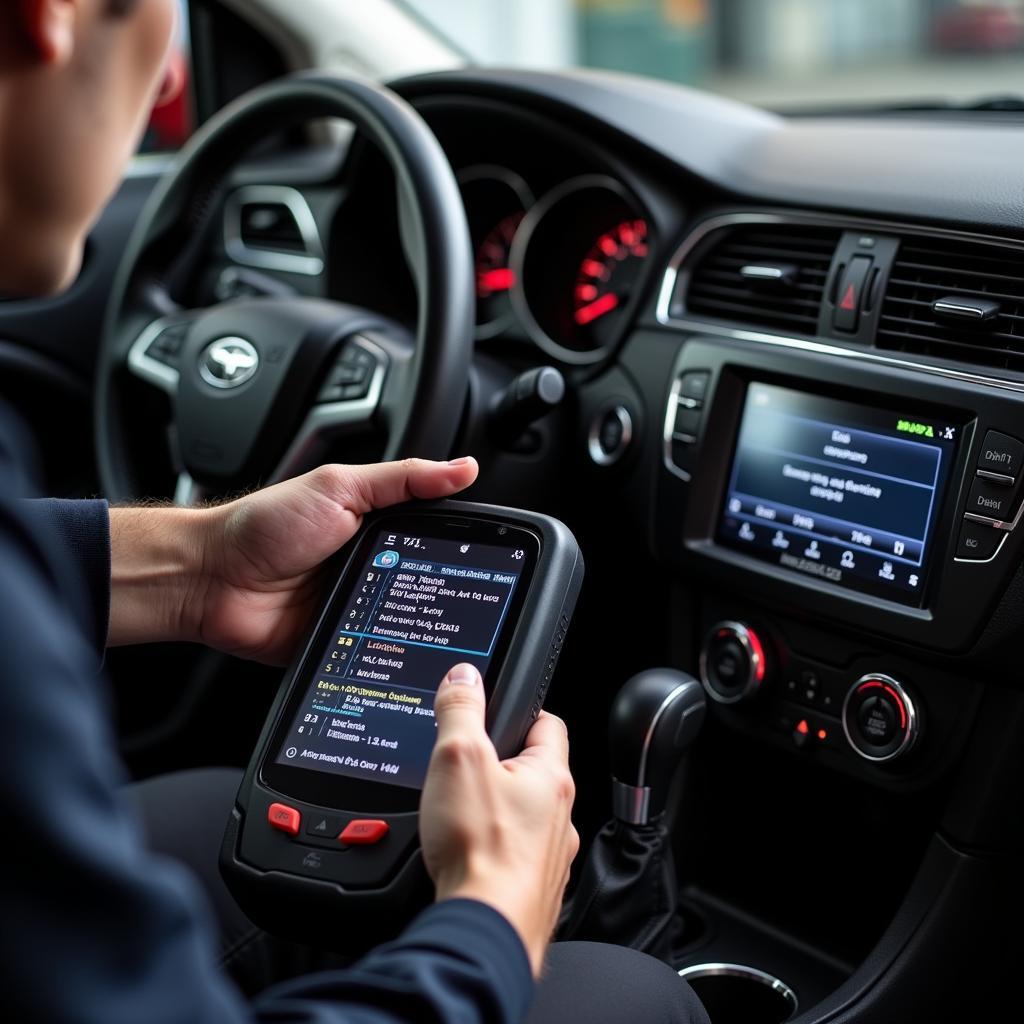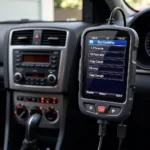A car diagnostic inspection is a crucial part of modern car maintenance. It involves using specialized equipment to communicate with your car’s computer system, reading stored data about its performance and identifying any potential issues.
Unveiling the Mysteries: How Car Diagnostic Inspections Work
Unlike traditional car inspections that rely on visual checks and manual tests, car diagnostic inspections delve deeper. They utilize a device called an OBD-II scanner, which plugs into your car’s onboard computer system. This scanner acts like a translator, deciphering the error codes stored in your car’s computer and presenting them in a readable format for mechanics. These codes act as clues, pointing to specific areas within your vehicle’s engine, transmission, exhaust system, and other critical components that might be malfunctioning or showing signs of wear and tear.
The Importance of Regular Car Diagnostic Inspections
You might be wondering, “Do I really need a car diagnostic inspection?” The answer is a resounding yes! Here’s why:
- Early Problem Detection: Diagnostic inspections can identify problems before they escalate, saving you from costly repairs down the road.
- Improved Performance: By addressing underlying issues, you can enhance your car’s fuel efficiency, performance, and overall lifespan.
- Safety First: Some car problems can compromise your safety. Diagnostic inspections help ensure your vehicle is in top condition.
- Informed Decisions: A thorough inspection provides you with valuable information about your car’s health, enabling you to make informed decisions about maintenance and repairs.
What to Expect During a Car Diagnostic Inspection
A typical car diagnostic inspection covers a wide range of systems, including:
- Engine and Transmission: Checking for misfires, fuel system problems, and transmission issues.
- Exhaust System: Monitoring emissions and identifying issues with the catalytic converter or oxygen sensors.
- Brakes: Analyzing the Anti-lock Braking System (ABS) for optimal performance.
- Airbags and Safety Restraints: Ensuring the proper functioning of critical safety components.
- Other Electronic Systems: Diagnosing problems with the power windows, door locks, and other electronic accessories.
does aa car check do diagnostic
Understanding Diagnostic Trouble Codes (DTCs)
During a car diagnostic inspection, if the OBD-II scanner detects a problem, it will generate a specific code, known as a Diagnostic Trouble Code (DTC). These codes are standardized, meaning a specific code indicates the same problem across different car makes and models.
For example, the code P0301 indicates a misfire in cylinder 1. While the code itself doesn’t pinpoint the exact cause of the misfire, it provides a starting point for further investigation. A qualified mechanic will use their expertise, along with additional diagnostic procedures, to determine the root cause and recommend the appropriate repair.
Car Diagnostic Inspection vs. Inspection: What’s the Difference?
It’s important to distinguish between a car diagnostic inspection and a standard car inspection. While both aim to assess your car’s condition, they differ in scope and depth.
A standard car inspection usually involves a visual check of your car’s major components, fluid levels, lights, tires, and brakes. It’s a more general assessment to ensure your car meets basic safety and roadworthiness standards.
On the other hand, a car diagnostic inspection goes deeper by tapping into your car’s computer system. It can detect hidden problems that might not be apparent during a visual inspection.
When Should You Get a Car Diagnostic Inspection?
Here are some instances when a car diagnostic inspection is highly recommended:
- Illuminated Check Engine Light: This is the most obvious sign that your car requires a diagnostic inspection.
- Unusual Noises or Smells: Any unusual sounds coming from your engine or strange smells should be investigated.
- Performance Issues: Experiencing rough idling, stalling, decreased fuel efficiency, or difficulty starting your car? A diagnostic inspection can help.
- Buying a Used Car: It’s always a wise decision to get a pre-purchase diagnostic inspection to uncover any hidden problems before you buy.
Choosing the Right Place for Your Car Diagnostic Inspection
When it comes to something as crucial as your car’s health, choosing a reputable and trustworthy mechanic is paramount. Look for shops that:
- Specialize in Diagnostics: Opt for mechanics with experience in car diagnostics and the proper equipment.
- Provide Transparent Pricing: Ensure you understand the cost of the inspection and any potential repairs upfront.
- Value Communication: Choose a mechanic who takes the time to explain the findings of the inspection in a clear and understandable way.
Conclusion
A car diagnostic inspection is an essential part of modern car maintenance, providing a comprehensive look into your car’s health and helping you stay ahead of potential problems. Regular inspections can save you money, improve your car’s performance, and ensure your safety on the road.
Remember, knowledge is power when it comes to car care. By understanding the importance of car diagnostic inspections, you can make informed decisions about your vehicle’s maintenance and keep it running smoothly for years to come.


